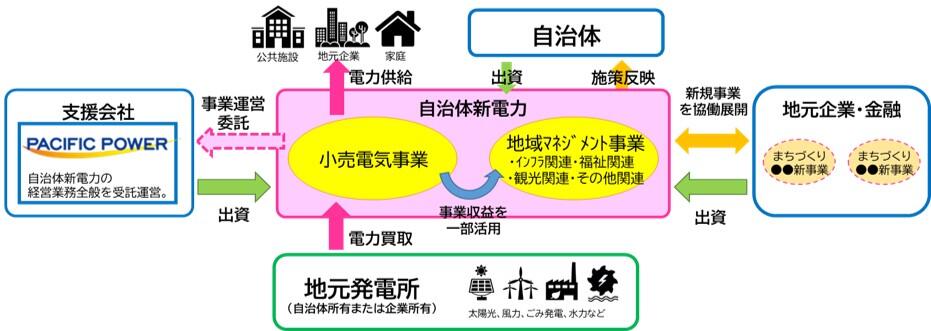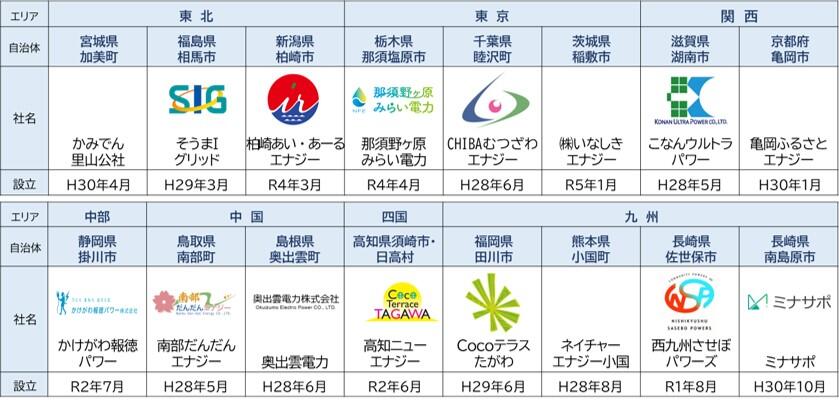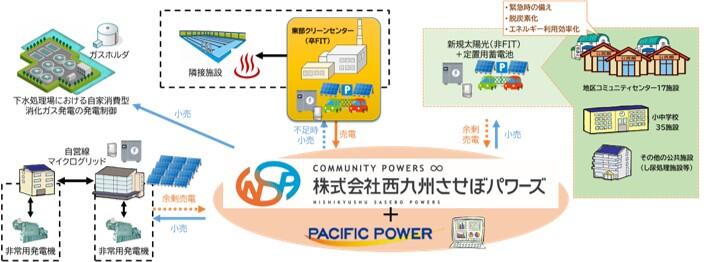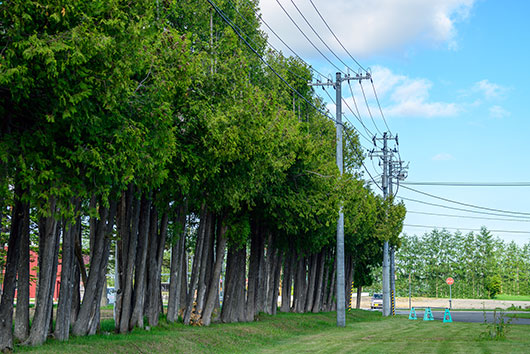Many local governments have declared themselves zero-carbon cities, and efforts toward decarbonization and carbon neutrality are being made through energy conservation, electrification, decarbonization of power sources, and low-carbonization of other energy sources. There are now Power Producers and Suppliers (PPS) companies in which approximately 80 local governments have invested, known as "municipal Power Producers and Suppliers (PPS)," across the country.
Why go to the trouble of establishment a local Power Producers and Suppliers (PPS) company to tackle carbon dioxide emissions in the region? What are the real benefits expected from establishment such a company? What should you keep in mind when actually establishment and running such a company?
PACIFIC CONSULTANTS GROUP owns Pacific Power, a company that is involved in Power Producers and Suppliers (PPS) business. The author, who is currently on secondment to the company, will explain the potential of Power Producers and Suppliers (PPS) businesses and the key points for establishment and operating them, drawing on his actual experience in running a business.
INDEX
- Municipal Power Producers and Suppliers (PPS) Companies = New Third Sector Companies
- Municipal Power Producers and Suppliers (PPS) are the backbone of regional GX
Municipal Power Producers and Suppliers (PPS) Companies = New Third Sector Companies
1. What are municipal Power Producers and Suppliers (PPS)?
Municipal Power Producers and Suppliers (PPS) companies are "regional Power Producers and Suppliers (PPS)" that operate retail electricity businesses with added value such as local production and consumption of energy, and are specifically funded by local governments. Since the liberalization of the electricity market in 2016, the number of these community-based Power Producers and Suppliers (PPS) has steadily increased, and currently there are just under 80 municipal Power Producers and Suppliers (PPS) nationwide.
When Power Producers and Suppliers (PPS) companies first became popular, the primary role they were expected to play was to reduce electricity bills. However, because they are funded by local governments, they are also expected to provide a variety of other roles and benefits beyond simply supplying cheap electricity.
Examples of these include local production and consumption of energy, the recirculation of funds (electricity bills) that had flowed out of the region within the region, and the use of profits to develop new businesses (Figure 1). Recently, there are growing expectations for local businesses to develop businesses that contribute to strengthening resilience, such as in disaster prevention, and to play a role as a driving force behind the achievement of the SDGs.

Municipal Power Producers and Suppliers (PPS) are a type of so-called "third sector." The third sector may give the impression of being "tough to manage," which may raise concerns, but the retail electricity business, which is the main business of municipal Power Producers and Suppliers (PPS), can be outsourced, and there is almost no need for initial investment or asset ownership. In addition, since the main customers are public facilities, the business risk is low and it is easy for municipalities to start up as a business.
2. Pacific Power supports Power Producers and Suppliers (PPS) with a focus on area management and regional management
PACIFIC CONSULTANTS CO., LTD. (hereinafter referred to as "our company") has long been anticipating future cuts in government budgets due to population decline, and has advocated the development of "regional management" and "area management" to create new mechanisms for maintaining regional infrastructure and services and promoting regional development as a new player in the region (Figure 2).
In the field of infrastructure civil engineering, which is our main business, representative examples include comprehensive road management in Sanjo City, Niigata Prefecture, and comprehensive sewerage management in Fuji City, Shizuoka Prefecture.
As part of these business developments, in response to the trend towards deregulation of the electricity market, establishment a wholly owned subsidiary Pacific Power Co., Ltd. Currently, the company invests in and supports 16 Power Producers and Suppliers (PPS) (Figure 3), making it the company with the most Establishment companies.


Municipal Power Producers and Suppliers (PPS) are the backbone of regional GX
1. What is the significance of going to the trouble of Establishment a Power Producers and Suppliers (PPS) company?
As of the end of March 2023, 934 local governments have declared themselves zero-carbon cities. However, we often hear from local governments that "we have declared it, but we are not sure what we are going to do. We don't know what to do." However, the methods of "CN (carbon neutral)" are clear, and are limited to energy conservation, electrification, decarbonization of power sources, and low-carbonization of other energy sources. Therefore, if local governments understand these methods, they should be able to settle on the idea that the implementation will be as cheap as possible through bidding.
So why is it necessary to go to the trouble of Establishment a Power Producers and Suppliers (PPS)?
As mentioned above, what was originally expected of municipal Power Producers and Suppliers (PPS) was to act as an intermediary for local production and consumption of energy, as well as to recycle funds (electricity bills) that had flowed outward within the region, and to develop new business ventures using profits.
This idea is considered to be close to GX (Green Transformation), which has begun to be promoted by the national government as a new keyword and focuses on "achieving both CO2 emission reduction and economic growth." In other words, municipal Power Producers and Suppliers (PPS) companies should be business entities that promote local versions of GX that take into account local issues and local economic growth.
2. Effects of Power Producers and Suppliers (PPS) companies
- Part 1: Effects on the retail electricity business -
1) It will streamline electricity procurement for local governments
Until now, local governments have procured electricity through bidding, with each department and facility individually basing their decision on "cheapness." In contrast, Municipal Power Producers and Suppliers (PPS) Companies are based on supplying electricity to public facilities through discretionary contracts with local governments. It cannot be said that they offer the lowest electricity rates, and "cheapness of electricity" is not the only criterion for their decision.
Municipal Power Producers and Suppliers (PPS) consolidate electricity demand and aim to procure electricity as cheaply as possible, while also contributing to the centralized management of administrative affairs related to power supply contracts. In this respect, it is believed that the "cheapness" of electricity is not limited to electricity rates.
Until now, electricity procurement has been done separately by each facility and department, relying solely on government know-how, but now it is consolidated, utilizing private know-how to provide relatively affordable prices and adding value by utilizing local power sources. In this respect, the retail electricity business handled by municipal Power Producers and Suppliers (PPS) companies can be considered similar to designated management of facility operations and PFIs.
2) It has responded to the rough seas of the electricity market
In fact, the aforementioned effects have been effective even in the face of the recent energy price hike. Local governments that continued to bid without the existence of municipal Power Producers and Suppliers (PPS) have found their power procurement bidding unsuccessful, becoming so-called "power refugees" and being forced to pay high electricity bills (guaranteed supply of last resort). On the other hand, municipal Power Producers and Suppliers (PPS) can grasp the trends of rising electricity market prices in real time and provide immediate consulting to local governments. Therefore, although they have raised electricity rates for many contracts, they have been able to maintain contracts with municipal Power Producers and Suppliers (PPS) as much as possible and make adjustments to minimize the damage (increased administrative budgets).
Part 2: Effects of promoting local return projects
3) It is expected that business speed will improve.
Local governments operate on a single-year budget system, and when starting a new project, it takes one year for budgeting and internal/parliamentary review, and at least one year for planning and design before the project can finally be put into operation. Furthermore, when it comes to decarbonization, while it would be good to promote energy conservation and the introduction of renewable energy in public facilities, the actual effects are difficult for citizens to understand, and it is easy for these to be given lower priority than other project budgets.
In this respect, municipal Power Producers and Suppliers (PPS) companies, as private companies, can immediately move to raise funds from banks, etc. For example, Figure 4 shows a case where the lighting in a gymnasium was converted to LED as a leasing business, and after receiving a request from the municipality, the company quickly made various considerations, made decisions, and arranged for fundraising, and the equipment was introduced within about six months.

4) Ability to work on cutting-edge projects that embody GX
Since municipal Power Producers and Suppliers (PPS) companies are the so-called third sector, it is important that they are linked and relevant to the policies of the local government. At the same time, it must be noted that citizens and assemblies will be asking, "Why should a municipal Power Producers and Suppliers (PPS) company be the owner of this business?" From this perspective, it is likely that municipal Power Producers and Suppliers (PPS) companies will choose businesses that are difficult for both the public and private sectors to get involved in, as they are areas where they would like to utilize private know-how, but which are highly public in nature and difficult to profit from. Among these, businesses that can create synergy through collaboration with retail electricity businesses will be given a particular priority.
Figure 5 shows a PPA project (a project to supply electricity directly from solar power generation facilities installed on the rooftops of buildings, etc.) aimed at strengthening the functions of evacuation shelters in areas where power outages occur frequently. Based on the purpose of the project, the conditions for the establishment and operation of the municipal Power Producers and Suppliers (PPS) power company include ensuring a certain level of capacity for the storage equipment, taking measures to improve profitability by utilizing storage equipment that is prone to becoming unprofitable for electricity supply in peacetime, and ensuring a management system for solar power generation, etc. in preparation for emergencies.

3. The essential value of Power Producers and Suppliers (PPS) companies = a scheme that creates a flow of funds in the region
What municipal Power Producers and Suppliers (PPS) companies are doing in the retail electricity business, for example, can be broadly defined as "improving results by making efforts that are possible only by dealing comprehensively and across departments, rather than by each administrative department individually as in the past," and "making the next investment based on the results (funds) obtained through these efforts."
While attention is often focused on the policy effects from the CN perspective, such as local production and consumption of energy, we believe that municipal Power Producers and Suppliers (PPS) should be business entities for promoting local versions of GX, and we believe that what is essentially important is for them to have the "funds" to invest in GX and to manage them effectively.
Given the various local circumstances, such as "municipalities themselves are constrained by budgets and it takes time to realize projects," "companies from outside the region may have the know-how but are unable to respond to local issues individually," and "few local companies have the financial capacity to make new investments," municipal Power Producers and Suppliers (PPS) companies believe that their greatest value lies in positioning themselves between these two and circulating funds.







